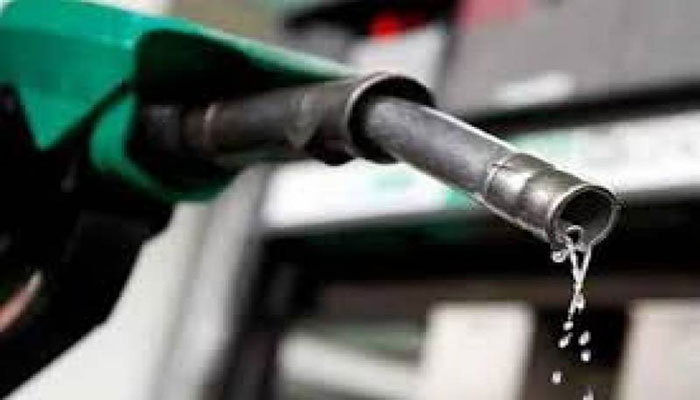Diesel, petrol prices up by Rs5 per litre each
ISLAMABAD: The government on Wednesday increased the petrol and diesel prices by Rs5 per litre each for the second-half of outgoing month.
The government maintained that the decision was made due to surge in international oil prices and also Pakistani rupee devaluation against the US dollar. Similarly, the kerosene and Light Diesel Oil (LDO) were also made dearer by Rs5.46/litre and Rs5.92/litre respectively. The new prices would be effective from September 16 (today) till end of the month.
With the increase in POL prices, the new prices of petrol will be Rs123.30 per litre, diesel Rs120.04 per litre, kerosene Rs92.26 and LDO price would be Rs90.69 per litre. The finance ministry in a statement said that owing to fluctuation in the petroleum prices in the international market and exchange rate variation, the prices of petroleum prices were increased.
In Pakistan, petrol is being used mostly in cars and motorbikes. Diesel is used in the agriculture and transport sectors. Consumers in remote areas use Kerosene for cooking purposes where Liquified Petroleum Gas (LPG) is not available. LDO is being used in industrial sector.
The government is also charging 17 percent general sales tax (GST) on all petroleum products. Apart from this, it is also collecting petroleum levy (PL) on these products, which is directly taken from consumers.
It is to be noted that in August 2018, when the PTI-led government came into power, the Brent oil price was $75.5 a barrel, while the local market price of diesel was Rs112.94 per litre, of petrol Rs95.24 per litre, of kerosene Rs83.96 per litre and of Light Diesel Oil (LDO) Rs75.37per litre.
Now, when the Brent price is almost at the same level, the petroleum products are considerably higher with petrol at Rs123.3 per litre, diesel Rs120.04 per litre, kerosene Rs92.26 per litre and LDO at Rs90.69 per litre.
Independent economists say that the increase in the petroleum products will have a negative impact on the economy by putting upward pressure on Inflation. It will increase power generation cost, goods transportation expenses and ultimately the cost of production.
Especially the limited income households will be hit hard, as it will erode their purchasing power and may now buy less with the fixed amount of earnings.
Another political economist said that inflation has become a ‘politically sensitive’ issue for this government and is a major challenge. For the last several months, the food inflation is in double-digits, pinching everyone hard.
-
 Seedance 2.0: How It Redefines The Future Of AI Sector
Seedance 2.0: How It Redefines The Future Of AI Sector -
 Andrew Mountbatten-Windsor Still Has A Loan To Pay Back: Heres Everything To Know
Andrew Mountbatten-Windsor Still Has A Loan To Pay Back: Heres Everything To Know -
 US House Passes ‘SAVE America Act’: Key Benefits, Risks & Voter Impact Explained
US House Passes ‘SAVE America Act’: Key Benefits, Risks & Voter Impact Explained -
 'Heartbroken' Busy Philipps Mourns Death Of Her Friend James Van Der Beek
'Heartbroken' Busy Philipps Mourns Death Of Her Friend James Van Der Beek -
 Gwyneth Paltrow Discusses ‘bizarre’ Ways Of Dealing With Chronic Illness
Gwyneth Paltrow Discusses ‘bizarre’ Ways Of Dealing With Chronic Illness -
 US House Passes Resolution To Rescind Trump’s Tariffs On Canada
US House Passes Resolution To Rescind Trump’s Tariffs On Canada -
 Reese Witherspoon Pays Tribute To James Van Der Beek After His Death
Reese Witherspoon Pays Tribute To James Van Der Beek After His Death -
 Halsey Explains ‘bittersweet’ Endometriosis Diagnosis
Halsey Explains ‘bittersweet’ Endometriosis Diagnosis -
 'Single' Zayn Malik Shares Whether He Wants More Kids
'Single' Zayn Malik Shares Whether He Wants More Kids -
 James Van Der Beek’s Family Faces Crisis After His Death
James Van Der Beek’s Family Faces Crisis After His Death -
 Courteney Cox Celebrates Jennifer Aniston’s 57th Birthday With ‘Friends’ Throwback
Courteney Cox Celebrates Jennifer Aniston’s 57th Birthday With ‘Friends’ Throwback -
 Camila Cabello Shares Update On Her Hair Two Years After Going Platinum
Camila Cabello Shares Update On Her Hair Two Years After Going Platinum -
 Prince William Steps In To Help Farmer's Awareness Mission
Prince William Steps In To Help Farmer's Awareness Mission -
 Queen Elizabeth Tied To Andrew's Sexual Abuse Case Settlement: Report
Queen Elizabeth Tied To Andrew's Sexual Abuse Case Settlement: Report -
 Mark Ruffalo Urges Fans To Boycott Top AI Company Boycott
Mark Ruffalo Urges Fans To Boycott Top AI Company Boycott -
 Prince William Joins Esports Battle In Saudi Arabia
Prince William Joins Esports Battle In Saudi Arabia




